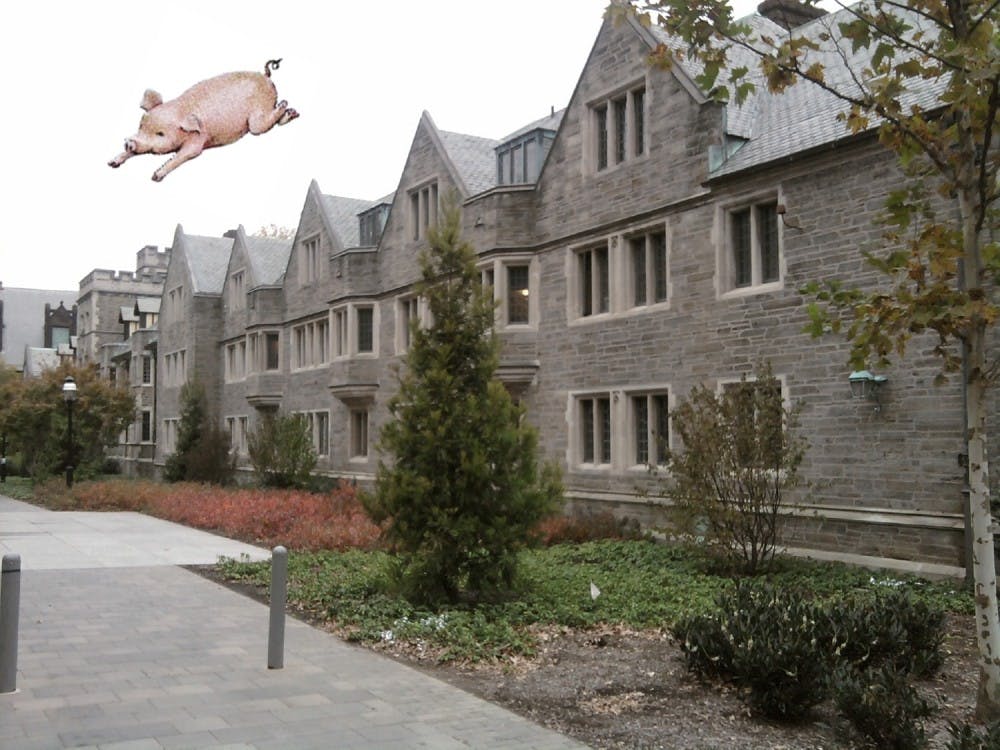Here are Noah and Michael's personal highlights from the conference.
(Noah)
The conference kicked off with a good ol' jam session at Small World Coffee on Witherspoon Street. Packed from one wall to the other, graduate students and miscellaneous conference attendees tried their luck at playing Pink Floyd tunes with mixed success but unwavering enthusiasm. That is to say, the Small-World-jammers started their conference experience by trying to step into Pink Floyd's shoes. Attempting to play the music of the band you're about to analyze and celebrate is one sure way to build admiration for previously-said band.
My time with the 5.1 surround-sound mix differed a bit from what Michael experienced. The scene was an odd mix of quaint and overwhelmingly high-tech. The listening hall was filled with lava lamps, carpets, and rice-paper lanterns. The speakers were ATC SCM150ASL 3-way 150 watt 15" monitors – five of them, plus two subwoofers. The monitors run at about $18,000 each. You do the math. To the credit of Princeton's wallet, I found that I could hear every penny. WhenAmused to Deathbegan, with a cascade of crickets and interspersed spoken word, the room spun around me as I, suddenly transported, looked for the source of the sound. The listening session went in increments of full albums, so I found the evening to wind on, despite the enthralling sonic depth. I guess I can only sit in a chair for so long, surrounded by thick sonic quilts of Pink Floyd, before I get a little restless.
My only truly uncomfortable moment of the conference was Ryan Sarno's discussion, entitled "They Fluttered Behind You: The Past as Material Object in Pink Floyd." I suppose every academic conference has to exercise its rights to be academic, which is to say that I, as an outsider, felt left out. I found the discussion to be rambling and I struggled to follow Sarno as he tried to lead me through different eras of Pink Floyd and the band's changing relationship with its own temporal existence. By the end of the discussion I was struggling with my existence too, and was ready for something fresh.
Luckily, PhD candidate Gilad Cohen from the Princeton Music Department was there to help, in what I thought was the high point of the conference. His lecture, "The Shadow ofYesterday's Triumph: 'Shine On You Crazy Diamond' and the Stage Theory of Grief," was relatively long, if title length gives any indication of discussion length. But Cohen had me riveted, as he danced across the stage from the piano to the podium, weaving between music stands and playing guitar licks. His lecture focused on the idea that 'Shine On' was written as a requiem for the band's former leader Syd Barrett, and that the song's arc musically followed the clinical stages of reconciliation with grief after loss. The audience went 'ooh' and 'of course' and 'wow!' as Cohen showed us how certain musical cues could pull us deep into moments of anger, denial, and acceptance, deeper than any lyrics could ever take us.
(Michael)
For me, hearing James Guthrie’s 5.1 surround sound mix ofTheDark Side of the Moonon Saturday was my favorite part of the conference. They shipped 7 state-of-the-art ATC speakers from overseas just to create this experience. The level of clarity achieved by the speakers really opened up my ears to a lot of finer details buried within the tracks. The more complex, audio effects laden tracks such as “Money,” “Time,” and “Speak to Me” definitely benefited the most from this kind of presentation. It felt great to simply sit back, close my eyes, and let the music flood my senses.
This brings me to another part of the conference that really impressed me. Whether this was intentional or not, I felt a very strong sense of cohesion in how the events were ordered, even on the day-to-day level. The first talk on Sunday, given by Troy Herion (another Ph.D. student here), featured a length discussion of the visual aspect of Pink Floyd’s music. Having closely listened toThe Dark Side of the Moonthe day before, I instantly knew what he was talking about as he went through the various ways Pink Floyd projected themselves visually.
Herion’s talk was followed by a talk on David Gilmour’s guitar solos, given by co-organizer Dave Molk. He really stepped outside of the “standard” academic talk format by opening up a lot of his ideas to the audience, allowing Pink Floyd devotees to share their own feelings on the music, which I thought was very keen on his part (though it did a bit contrived at times). It showed a lot of respect towards the fans that came to celebrate Pink Floyd and created an open and interesting conversation. As a guitarist, I found his idea of looking at Gilmour’s solos from a slide guitar perspective to be quite innovative, as it forced me to take another look at some of Gilmour’s solos I learned in the past.
Lastly, even though Noah already talked about this, I really have to emphasize how great Gilad Cohen’s talk on “Shine On You Crazy Diamond” was. “Shine On” was never one of my favorite Pink Floyd songs until Gilad gave a thorough analysis of the emotional depth conveyed by the song, which really illuminated some of the more ineffable qualities of Pink Floyd’s songwriting.
Walking into this experience, I wasn’t sure what to expect. Music + academics? I wasn’t sure if I was going to get a bunch of super-enthusiasts that could tell you the tracklist on every record in Pink Floyd’s discographies or advanced musicologists presenting on deep analysis of the band’s songs and histories. It turns out I got the best of both worlds: Cohen and Molk successfully created an event that was accessible to all disciplines, with something to satisfy both the casual and die-hard fans. I walked out of the conference a little tired from the Pink Floyd fanaticism, but it was well worth it.






